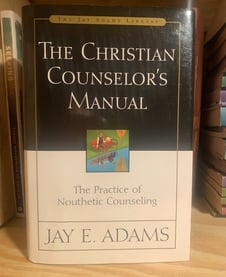Understanding Jay Adam's 50 Failure Factors in Biblical Counseling
How do we stay on target with what God has for our counselees? We must pray and consider how we can change. These 50 factors are one way to self-reflect prayerfully to do our best for those we counsel.
Shelly Lynn Henry
2/13/20253 min read


Evaluating the quality of my Biblical Counseling
Biblical counseling is a unique approach to helping individuals navigate their challenges based on the truth of Scripture. Seen as a founder of biblical counseling, Dr. Jay Adams, provides a wealth of information and support in his many books. While this counseling approach can be transformative, it is crucial to recognize potential pitfalls that can impede biblical growth in our counselees. In this post, I am sharing the 50 failure factors identified by Jay Adams in biblical counseling, which shed light on where counseling may not be going well. I started exploring these when I experienced challenges and will continue to go back to this list again and again and asking God to search me and change me to be more Christ-like.
The Importance of Identifying Failure Factors
Understanding the failure factors in biblical counseling allows practitioners to identify and rectify issues before they escalate. Jay Adams meticulously outlines these factors in his works, aiming to help counselors improve their practice and outcomes for clients. Each factor serves as a reminder of critical elements that can influence counseling success, including personal biases, adherence to Scripture, and the counselor's own spiritual health.
Key Factors That May Hinder Counseling Success
Among the 50 failure factors outlined by Jay Adams, several stand out as particularly impactful. Firstly, a counselor's lack of familiarity with biblical texts can lead to misunderstandings and misapplications of spiritual guidance. Secondly, improper assessment of the counselee's issue may result in recommendations that do not address the root cause of their struggles. Moreover, failing to establish a trusting relationship can impede open communication, leaving counselee feeling vulnerable and reluctant to share their deeper issues.
Another critical factor is the tendency for counselors to apply secular psychological principles over biblical truths. Although integrating some psychological insights may be tempting, it is unnecessary because the Word of God provides all we need for life (2 Timothy 3:16-17). Lastly, the spiritual state of the counselor can significantly affect the effectiveness of the session. Personal struggles or unresolved sins can hinder a counselor's ability to guide counselees effectively.
In conclusion, Jay Adam's 50 failure factors serve as helpful self-reflections for counselors seeking to enhance their approach to biblical counseling. By being aware and prayerful of these factors and desiring to be nearer to God, we can facilitate a more effective and spiritually enriching environment for our counselees. Awareness of these pitfalls not only elevates the quality of counseling given but also ensures a more profound alignment with biblical principles, ultimately fostering holistic healing.
2 Timothy 3:16-17
New American Standard Bible
16 All Scripture is inspired by God and beneficial for teaching, for rebuke, for correction, for training in righteousness; 17 so that the man or woman of God may be fully capable, equipped for every good work.
James 4:8
English Standard Version
8 Draw near to God, and he will draw near to you. Cleanse your hands, you sinners, and purify your hearts, you double-minded.
Psalm 139:23 English Standard Version
23 Search me, O God, and know my heart!
Try me and know my thoughts!


50 Failure Factors
in biblical counseling






Fifty Failure Factors
By Jay Adams
Counselor, are you stuck with a difficult counseling situation that just does not seem to be moving forward? Is it possible that YOU have failed in your handling this situation? Here is a list of questions you should ask yourself:
Is the counselee truly a Christian?
Has there been genuine repentance?
Is there a vital commitment to the Biblical change?
Are our agendas in harmony?
Do you have all the necessary data?
Are you trying to achieve change in the abstract or concretely?
Have you been intellectualizing?
Would a medical examination be in order?
Are you sure you know the problem(s)? Is more data gathering necessary?
Are there other problems that must be settled first?
Have you been trying to deal with the issue while ignoring the relationship?
Did you give adequate scriptural help? ... (download for the complete list)

Growth
Experience biblical change through Jesus Christ today.
Faith
Bible
© 2024. All rights reserved.
How can I help?
DISCLAIMER: While I possess a Masters degree and Bachelors degree in psychology, I am not a licensed counselor. My ministry is about discipleship and evangelism through the Word of God. And as such, I provide only Scriptural biblically-based counsel and one-on-one discipleship for women exclusively. I do not provide psychological solutions because, frankly, it "falls short in their answers since they do not acknowledge the reality of a personal God in Who's presence mankind is always functioning and developing. The Bible is sufficient in constructing a comprehensive model of biblical counseling. The work of biblical counseling is an endeavor in which all believers should participate, and that it is a work to be shared by the entire body of Christ" (The Association of Biblical Counselors). The Word of God is all we need for Spiritual guidance and growth. I am honored to walk with women on their path to greater freedom in Christ and would be happy to speak with you more and answer any additional questions you may have. You can also check out my website for information on "What is Biblical Counseling?"
LOVE
PRAYER


Original Artwork by Brittney Day 2023
